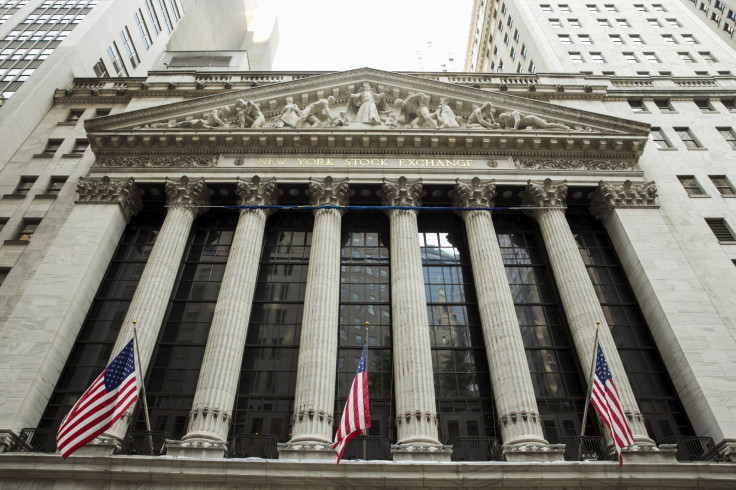Friday's Stock Market Open: US Equities Plunge Despite Strong Jobs Data, Oil Sinks

KEY POINTS
- U.S. added 273,000 new jobs in February
- The World Health Organization reported at least 95,270 coronavirus cases around the globe
- U.S. unemployment rate was at 3.5% -- the lowest level in more than 50 years -- in February
Update: 3:05 p.m. EDT:
U.S. stocks plunged in late Friday afternoon trading as markets faced the last hour of a wild and turbulent week.
The Dow Jones Industrial Average plunged 828.44 points to 25,292.84 while the S&P 500 dropped 117.3 points to 2,906.64 and the Nasdaq Composite Index tumbled 350.15 points to 8,388.44.
WTI crude oil futures plummeted 10.3% to $41.16 per barrel.
The 10-year Treasury yield was at 0.699%
Update: 12:05 p.m. EDT:
U.S. stocks traded lower as of Friday noon, but above early morning lows.
The Dow Jones Industrial Average dropped 510.59 points to 25,610.69 while the S&P 500 plunged 74.85 points to 2,949.09 and the Nasdaq Composite Index tumbled 242.46 points to 8,496.14.
In Europe markets finished sharply lower as Britain’s FTSE-100 plunged 3.62%, France’s CAC-40 swooned 4.14% and Germany’s DAX tumbled 3.37%.
Oil futures have dropped to $42.40 per barrel while the 10-year Treasury yield fell to 0.735%.
Chief economic advisor Larry Kudlow said the White House is considering “targeted measures” to alleviate the negative impact on the airline industry from the coronavirus outbreak. The Washington Post reported White House may offer tax relief for airline, travel, and cruise industries hurt by coronavirus.
The Commerce Department said wholesale inventories fell by 0.4% in January after dipping a revised 0.3% in December. The Commerce Department also said the trade deficit dropped by 6.7% in January to $45.3 billion as exports fell.
Commenting on Friday's strong U.S. jobs data, Diane Swonk, chief economist at Grant Thornton, said: “The labor market held up extremely well at the start of the year with an extra boost from unseasonably mild winter weather. That resilience will help blunt the blow from COVID-19, especially as layoffs in the service sector mount.
Original story:
U.S. stocks plummeted on Friday, continuing a wild week on Wall Street, as fears over coronavirus overwhelmed strong jobs numbers.
The Dow Jones Industrial Average dropped 754.58 points to 25,366.70 while the S&P 500 plunged 86.30 points to 2,937.64 and the Nasdaq Composite Index tumbled 268.43 points to 8,470.16.
Oil prices plunged to multi-year lows on Friday as OPEC+ met in Vienna, but Russians and Saudis deadlocked on production cuts.
President Donald Trump on Friday signed an $8.3 billion spending bill to fight the spread of the new coronavirus.
The World Health Organization reported at least 95,270 coronavirus cases have been confirmed around the globe, with at least 3,280 deaths.
Iran’s death toll rose to 124 people on Friday, while Netherlands confirmed its first coronavirus-related death. As of Thursday, Italy reported 3,089 cases of the virus, with 107 deaths. Even the Vatican reported its first case. South Korea now has almost 6,600 infections.
The Labor Department reported Friday that the U.S. economy added 273,000 new jobs -- above expectations -- in February, while the unemployment rate clocked in at 3.5% -- the lowest level in more than 50 years.
Average hourly earnings grew by 3% over the past year, while the average work week edged up to 34.4 hours.
“Now more than ever, we need to focus on the labor market data,” said Liz Ann Sonders, chief investment strategist at Charles Schwab. “The consumer has kind of kept things afloat.”
S&P Global Ratings estimated that the coronavirus crisis could erase $211 billion from economies across the Asia Pacific region.
DoubleLine Capital CEO Jeffrey Gundlach told CNBC on Thursday that he thinks the Federal Reserve acted out of panic in cutting rates earlier this week.
“If we look at history, once the Fed does a panic, intermeeting rate cut, particularly when it’s 50 basis points ... they typically cut pretty quickly again,” Gundlach said. “I’m in the camp that the Fed is going to cut rates again, perhaps even in two weeks.”
Gundlach added: “We will see short rates headed toward zero… When I say panicked, it doesn’t mean it’s not justified. Sometimes panic is justified. Business activity is likely to contract.”
Overnight in Asia, markets finished lower. China’s Shanghai Composite dropped 1.21%, while Hong Kong’s Hang Seng fell 2.32%, and Japan’s Nikkei-225 tumbled 2.72%.
In Europe markets traded sharply lower as Britain’s FTSE-100 plunged 3.92%, France’s CAC-40 swooned 4.42% and Germany’s DAX tumbled 3.94%.
Crude oil futures dropped 4.03% at $44.05 per barrel and Brent crude plunged 3.88% at $48.05. Gold futures gained 1.04%.
The euro rose 0.88% at $1.1335 while the pound sterling gained 0.55% at $1.3021.
© Copyright IBTimes 2025. All rights reserved.





















